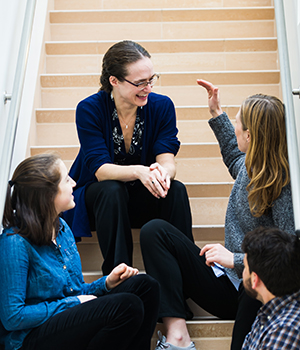
Rebecca Saxe
(she/her)
Brain and Cognitive Sciences
Generously present
Professor Rebecca Saxe believes science is both a pleasure and a privilege. “We get to spend our time pursuing hard elusive ideas because of our own profound curiosity,” she muses. “And it is possible for that pursuit to be intrinsically motivating and satisfying.”
This approach has informed her excellent mentorship practices in MIT’s Brain and Cognitive Sciences Department, where Saxe is John Jarve (1978) Professor of Cognitive Neuroscience and Associate Member of the McGovern Institute for Brain Research. Saxe’s graduate students laud her for being “always present,” and were moved to nominate her for a Committed to Caring (C2C) Award, which she received in 2018. In the classroom and in the lab, Saxe’s students wrote in nomination letters, she both commits to whatever she is currently doing and also cares about and “devotes thought and attention to individuals,” whether they are colleagues, students, or community members.
She received her B.A. in Psychology and Philosophy from Oxford University and her PhD in Cognitive Science from MIT. Saxe’s cutting-edge research investigates an array of questions such as, “how does the brain construct abstract thoughts?” and “what aspects of our brains are biological and what aspects are specific to a culture, or unique to an individual?” Recently, the Saxe lab has made important contributions to the discovery of a group of brain regions in the human cortex that determine how humans reason and infer about the actions of other humans. Saxe’s success in such endeavors has brought her renown both in academia and outside of it. For example, her TED talk has been viewed nearly 3 million times and its transcription has been translated into 33 languages.
Generous and Welcoming
Saxe’s nominators write that through her research and engagement with the public, Saxe is “an extremely generous and kind person who is invested in making the world a more generous and kind place.”
Giving with both her time and attention, Saxe fosters a friendly and inclusive work environment (one of the Mentoring Guideposts identified by the C2C Program). Most notably, she welcomes to her lab collaborators of diverse academic backgrounds: “…for some, working in Rebecca’s lab is an introduction to academic research. These opportunities are incredibly meaningful and result in a more diverse and rich lab environment.”
This attitude of inclusion does not stop with her lab or with academic colleagues. Consistently finding opportunities to engage with the broader public, one advisee remarked that Saxe “not only encourages lab members to organize and hold outreach events, but she herself gives talks and presentations to general audiences, such as TED talks, ‘stage shows’ at the MIT museum, and presentations associated with Cambridge Science Festival.”
For Saxe, good mentorship is a crucial component of her own work. When responding about how she balances all of her responsibilities Saxe notes, “As a scientist, I do almost all of my ‘real’ work in collaboration with students and post-docs. So, advising and mentoring is very compatible with my responsibility to do research.”
A legacy of good mentorship
When asked about her own mentors in graduate school, Saxe recalled that she had three amazing role models during her training who were critical to her development as a scientist.
While an undergraduate at Oxford University, Saxe first learned to be a scientist under the direction of neuroscience Professor Kia Nobre. Nobre encouraged Saxe to accept struggle and inconclusive results. For Saxe, Nobre is “a role model of taking pleasure in hard work in science.”
At MIT, Professor Nancy Kanwisher was especially influential and supportive of Saxe’s doctoral work. Kanwisher’s enthusiasm for science is so deep and real, Saxe recalls, “it’s profoundly contagious.” When discouraged in graduate school, talking things through with Kanwisher reminded Saxe that making the extra effort was well worth it. Saxe lauds, “she has an exceptionally rigorous mind.”
Saxe later worked with Professor Susan Carey as a post-doctoral fellow at Harvard University. Saxe calls Carey “an incredibly deep thinker about the mind.” Saxe explains that in a field where it is tempting to be vague about what ideas mean, Carey pushes people to try harder for clarity. Some of Saxe’s best ideas have come out of debating with Carey.
It is clear from her Committed to Caring nominations that Saxe holds these lessons close as she runs her own lab. Saxe reflects, “All three of these impressive and amazing women inspire me to this day.”
